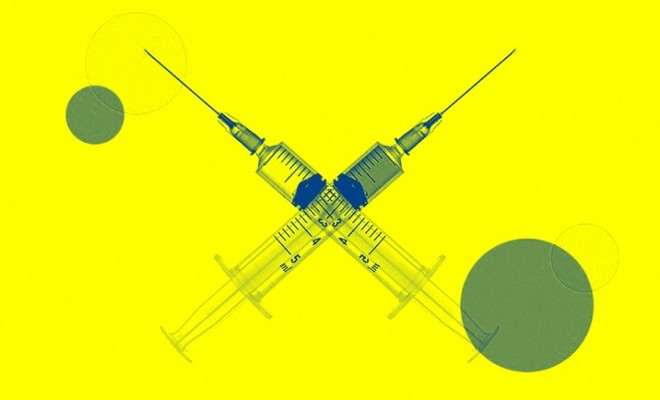
The pandemic reawakens bioweapon fears
The immense human and economic toll of the COVID-19 pandemic only underscores the threat posed by pathogens that could be deliberately engineered and released, Axios’ Bryan Walsh writes.
Why it matters: New technology like gene editing and DNA synthesis has made the creation of more virulent pathogens easier. Yet security and regulation efforts haven’t kept pace with the science.
What’s happening: Along with AI, engineered pandemics are widely considered the biggest existential risk facing humanity.
- That’s in part because a pathogen could be engineered in a lab for maximum contagiousness and virulence, well beyond what would arise through natural selection.
COVID-19 has shown the vulnerability of the U.S. and the world to biological threats both natural and manmade.
- “Anyone looking for a radical leveling approach — whether a state actor like North Korea or a motivated terrorist organization — may be influenced by COVID-19 to consider pursuing a biological weapons capability,” says Richard Pilch of the Middlebury Institute of International Studies.
While earlier bioweapons fears focused on the possibility that a state or terror group could try to weaponize a known dangerous agent like smallpox — which would require somehow obtaining restricted pathogens — new technology means that someone could obtain the genetic sequence of a germ online and synthesize it in a lab.
How it works: Currently, synthetic DNA is ordered through commercial suppliers. But while most suppliers screen DNA orders for the sequences of dangerous pathogens, they’re not required to — and not all do, which means safety efforts are “incomplete, inaccurate and insecure,” says Kevin Esvelt, a biologist at the MIT Media Lab.
What’s next: Experts agree on the need for a stronger international regime aimed at controlling bioweapons and regulating dual-use biotechnology research. But given the growing animosity between the U.S. and China over the origins of the novel coronavirus, that may be an impossible ask.
- Esvelt has proposed the creation of a secure screening processthat would use advanced cryptography to make it far more difficult for rogue actors to obtain synthetic DNA that could be used for potentially dangerous purposes.
“COVID-19 has been a catastrophe for the world, but there is a potential for even greater catastrophe. And we are not prepared for this.”
— Beth Cameron, Nuclear Threat Initiative
-Sharing in pandemic times
Amid escalating geopolitical tensions and efforts to trace the origin of the novel coronavirus, experts say an international legal framework is needed for sharing biological samples and genetic data during pandemics.
The big picture: This pandemic is exposing legal gaps for sharing virus samples and sequencing data that could hinder responses to international health emergencies, according to a new paper in the journal Science.
Background: China published the SARS-CoV-2 genetic sequence on a public database in January and researchers around the world immediately began developing diagnostic tests for the virus and used the sequence to create an infectious clone.
- But efforts to gain accessto virus samples from China haven’t been fruitful.
Scientists interviewed by Axios say there is less need now for early samples of the virus to develop vaccines and treatments as it has spread itself around the world.
- But it could help to understand the virus’ origins and, they say, sharing of genetic information and samples is key to understanding what other viruses are out there and for responding to future outbreaks.
Where it stands: A patchwork of legal frameworks, binding and nonbinding, pertaining to some types of viruses and information but not others means access to valuable data isn’t a guarantee and depends on scientific collaboration in an increasingly politicized world.
- The World Health Organization’s International Health Regulations currently require members to share “public health information” related to potential international outbreaks but that doesn’t include physical samples or genetic sequencing data.
- The Pandemic Influenza Preparedness (PIP) framework outlines nonbinding access among WHO member states, industry and others to physical samples of influenza viruses with human pandemic potential.
- Existing UN protocols, set up to protect biodiversity, give countries the ability to determine who gets access to genetic resources within their borders and how any associated benefitsof those resources are shared.
What to watch: In the future, genomic sequencing data may not be as readily shared, says Lawrence Gostin, an author of the paper and a professor of law at Georgetown University.
- He warns that researchers that use genetic data to synthesize a virus could sidestep rules that obligate the benefits of research to be shared and, in turn, make others hesitate to share genomic data. During a pandemic, that could be “catastrophic,” he and his colleagues write.
- They propose expanding either PIP to cover other viruses and genetic sequencing data or the WHO’s International Health Regulations to include sharing pathogen samples and genome sequencing data during potential international outbreaks.
Yes, but: There are barriers rooted in the divide and distrust between countries based on past experience of governments, companies and researchers cutting out collaborators in countries providing resources.
The bottom line: “If we want to survive the next pandemics, we need open scientific sharing and to find an international mechanism that allows for that,” Gostin tells Axios.
–Worthy of your time
Antibiotic-resistant superbugs could be worse than COVID-19 (Eric Allen Been — OneZero)
- This is a terrifying read about the “dual assault” of virus and bacteria in the 1918 flu, possibly with COVID-19 and beyond.
Our weird behavior during the pandemic is messing with AI models (Will Douglas Heaven — MIT Tech Review)
- “Machine-learning models trained on normal human behavior are now finding that normal has changed, and some are no longer working as they should.”
COVID-19 may permanently shutter museum devoted to vaccination pioneer (Susan Cosier — Smithsonian Magazine)
- Edward Jenner, who developed the world’s first successful vaccine and shared it far and wide even as countries were at war, wrote in 1803: “the Sciences are never at war.”
Πηγή: axios.com




